30 May 2025
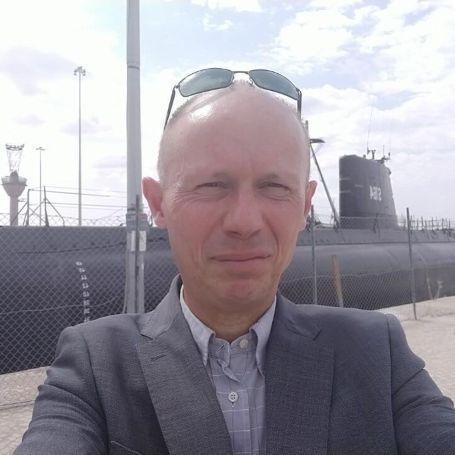
“When Franck leaves the office, he texts me to let me know and I know it takes him around 35 minutes to cycle home,” said Soazig, Franck’s wife. “So, when 45 minutes had gone by and he wasn’t home, I knew something had happened.”
In February 2024, Franck, a French Submariner working in London, was cycling home from the NATO HQ in Northwood when he lost control of his bike going downhill. He fell from the bicycle and was left severely injured on the road. Luckily, he was wearing a helmet.
“When he still hadn’t arrived home, I decided to take the car and drive the route I thought he would have cycled, but I found nothing,” said Soazig. “With no other option, I drove back home. There I found the police waiting for me.
“All I could think was is he dead or alive?”
The police informed Soazig that her husband had been taken to St Mary’s Hospital and that they would drive her there on blue lights immediately. They didn’t know what had happened or how he was.
“That confirmed to me that he was seriously injured, as otherwise he would have been taken to our local hospital. But I concentrated on the fact that he was alive. That meant there was hope.”
At the scene, Franck was first attended to by London Ambulance Service (LAS) paramedics. He had been found by bystanders, lying on the road next to his bicycle. He was clearly disorientated with a reduced level of consciousness and had a wound to the right side of his forehead. This combination suggested he had sustained a traumatic brain injury. They started to treat him by administering oxygen, placing a cannula and putting a pelvic binder on him. They then placed Franck into the back of an ambulance and started to convey him to the nearest major trauma centre. Meanwhile, London’s Air Ambulance’s advanced trauma team had been dispatched by car: they were going to rendezvous with LAS on the A40 motorway.
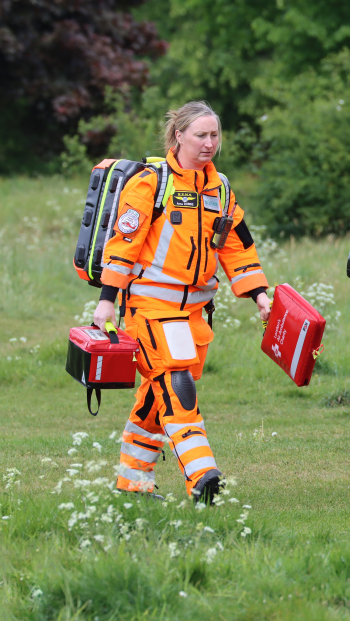
On their arrival and after assessing Franck, our team agreed with the LAS paramedics that he had sustained a traumatic brain injury.
Our Clinical Lead, Dr Anna Dobbie, who attended to Franck on the day, said: "I remember when we assessed Franck that it was clear he was very poorly – he was showing all the signs of a potentially very significant head injury. He required intervention as quickly and efficiently as possible to give him the best chances of a positive outcome.”
At this point Franck was also cerebrally agitated, so our crew induced him into a coma by giving him a general anaesthetic and connecting him to a breathing machine. This is something only our team can do on scene in London. The team then made a pre-alert call to the receiving hospital, travelled with him and handed him over to the hospital trauma team.
At the hospital, Soazig was informed that Franck had indeed suffered a traumatic brain injury, as well as a broken pelvis, broken ribs and a collapsed lung. She was advised to call her daughters, who were living in Paris, Stockholm and Amsterdam. They needed to make their way to London, now.
“That was the most horrible thing I have had to do in all my life. It was so distressing hearing the girls cry on the phone and being totally helpless.”
Franck was in the intensive care unit when Soazig first saw him. “It was a shock, seeing my husband intubated, with syringes everywhere and constant beeps. The first time you just don’t know what to do. I touched him and spoke to him, but it was so surreal. You’re in another world. At one point I felt like I was floating above my body, just watching something from another perspective.
“The nurse gave me his wedding ring, saying his hands were going to swell up. All the time he was in hospital I wore it, I put his on and then mine on top to keep it on. I never removed it’’
The clinicians informed Soazig that there was a long journey ahead – a marathon. “We were also told life was never going to be the same again. But how different it would be, they had no idea.”
Physically, it was likely Franck would make a good recovery, but cognitively, it was near impossible to tell until he woke up. There were concerns around the extent of the brain injury and how much damage had been caused.
“I couldn’t stop thinking that there was a chance he would never wake up.”
Two weeks later, on the second attempt to reduce Franck’s sedation, he responded well. The intracranial pressure was still a little high, but manageable. Then Franck started breathing for himself whilst still on the ventilator.
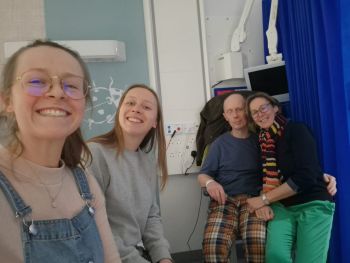
“This was a monumental step. We’d been told coming off the ventilator was a milestone.”
For nearly a month, Franck stayed on the major trauma ward but suffered from post-traumatic amnesia, which is very common following a brain injury. “He was talking as if he was still at work, organizing exercises and trying to call Italy and France. It was almost like he was stuck in a different world.
“He didn’t understand why he was there and would keep making plans to try and escape! Physically he was getting stronger, so we’d sometimes have to restrain him. He called me all sorts of names… luckily in French!”
Four weeks later, Franck started showing signs of lucidity. Surrounded by incredibly strong family and friends, he began the journey of recovery.
“He started to understand why he was there and would be comforted by our reassurances. Physiotherapists started to test him – the first time he stood, he did three to four steps. This was a success, it showed us he remembered how to walk. He was so frail, he had lost so much weight, but he remembered. The occupational therapist gave him a toothbrush and he took it to his mouth – he remembered what it was for. Remembering these basic actions meant we didn’t have to start from scratch.”
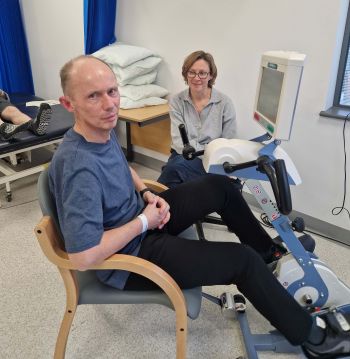
From then on, Franck’s mental determination and tenacity powered his recovery. He was desperate to get back to work, that was his goal. So, his family continued to support him, pushing his recovery continually. “We would do stimulation exercises every time we could, asking mini questions, using whiteboards. He was so dedicated.”
Six weeks after the incident, Franck was moved to a rehabilitation facility, where his progress just continued, with an intense schedule of physiotherapy, occupational therapy, speech and language therapy, alongside digital exercises and the time to sleep and rest.
Physically, Franck was strong and able, it was the mental tasks which required a lot of concentration and could be a challenge.
After four weeks in the rehab unit, Franck was able to be discharged home.
“We saw the neuro consultant when we left, he was delighted. He said ‘if you showed me the original scans and this man now, I wouldn’t believe they were the same person’.”
Back home with Soazig, Franck continued to progress.
“In June, Franck reached his goal – the medical assessment cleared him to go back to work part time,” beamed Soazig.
Now, only one year on from the incident, Soazig and Franck are living in the Netherlands, where Franck is now posted, working full time and back to cycling to work
“He is our hero. To come back to us, to life, considering the injuries he had. He is our hero.
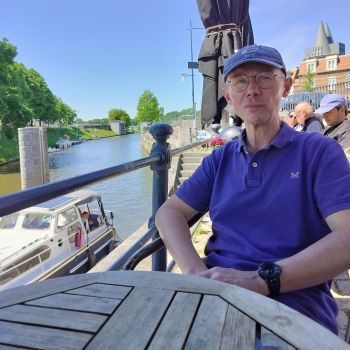
“The picture we were given initially was one where he would have difficulty understanding us, severe aphasia, quite a bleak picture. I knew if he couldn’t converse with us it was going to be difficult for him to handle.
“However thankfully, in most ways, he is back to being Franck. His personality is exactly the same, his humour is the same, he is my Franck. He can still be a little tired than normal and sometimes he confuses two words that are similar. There’s slight hearing loss on one side, but they are very minor consequences.
“What made a huge difference is how well Franck was treated at the roadside. How quickly he was looked after and placed into a medical coma, that limited the damage. It’s remarkable.”
Dr Anna Dobbie said: “I am so thrilled to hear of Franck’s truly incredible recovery. It was a privilege to play a small part in his journey."
After this deployment, Franck and Soazig plan to retire, moving back to Brittany where they’re both from. It is such a pleasure to tell such a miraculous story of recovery and witness this incredible family move forwards together.
“Our girls, our community, our families who travelled from abroad to be with us, they were all amazing and played such an instrumental role in Franck’s recovery. We were all there for every minute of visiting hours from 11am to 7pm, so many visitors we had to make a schedule!
“But without London’s Air Ambulance Charity, Franck wouldn’t be where he is now. I will be grateful forever to the charity.”
Soazig also spoke about the support our Patient Liaison Nurse gave her during the time in hospital: “There are some people you hope to never have to meet, but then when you do, you’re so glad. He was amazing and his support gave us hope and strength.
“He also gave us a booklet with stories from other families, which I found so helpful. I thought if they can do it, my Franck can do it.” You can read our 10 stories to inspire hope booklet here.
“To anyone else going through this, I would say take one day at a time. Don’t make plans. Look after yourself. And when they wake up – be ready. I found the post traumatic amnesia the worst part, but it may have been easier if I was prepared.
“It’s an experience. Everything was perfect, we’d had a lovely life, we’d travelled the world, we’d had three lovely successful daughters. Then in a second, everything changes.
“But you can get through it. Be hopeful. Be strong. Be supported.”
If you’re loved one has been injured and you’re trying to navigate the recovery, Soazig has offered further advice below:
- Two things that kept me going were first, my daughters. I had to be strong for them. Secondly, my unconditional love for my husband gave me strength. I would have done anything for him, and I was ready to face any type of future, as long as it was with him. So, focus on that.
- Keep a diary: we assume that we'll remember everything but it's not true. You can write about:
- the circumstances of the accident
- the medical care, procedures and tests, with dates to create a timeline. I also wrote the name of the nurse for each day when in his own room and doctors we talked to.
- your daily routine outside the hospital, with its good and bad moments, your doubts about your future, your feelings
- the visits of friends, family, colleagues (Franck was amazed to read how many people had come to see him in ICU and major trauma)
- what is going on in the world (it's a good way for the person with TBI to reconnect with the family and join the dots. Franck had no memories of the first five and half weeks with the coma and post traumatic amnesia).
- Create a WhatsApp group with your close family members to send a daily update so that you don't have to answer lots of messages. Then people in the group can relay the information to other people.
- Don't hesitate to say that you don't want any phone calls if it's too much for you. You have to protect yourself and think about your mental health. Don't add another layer of stress in your life, it has already been turned upside down.
- Limit the visits of friends and colleagues to two a day. It's lovely to see people coming to visit your husband, but it's also mentally draining and some days, I felt I hadn't spent enough time with him.
- On a very practical note, make a list of the numerous passwords for different sites – especially the ones related to life insurance and bank accounts etc. You can also get a power of attorney on your various bank accounts. That will lift a lot of the admin and financial burden off your shoulders.

